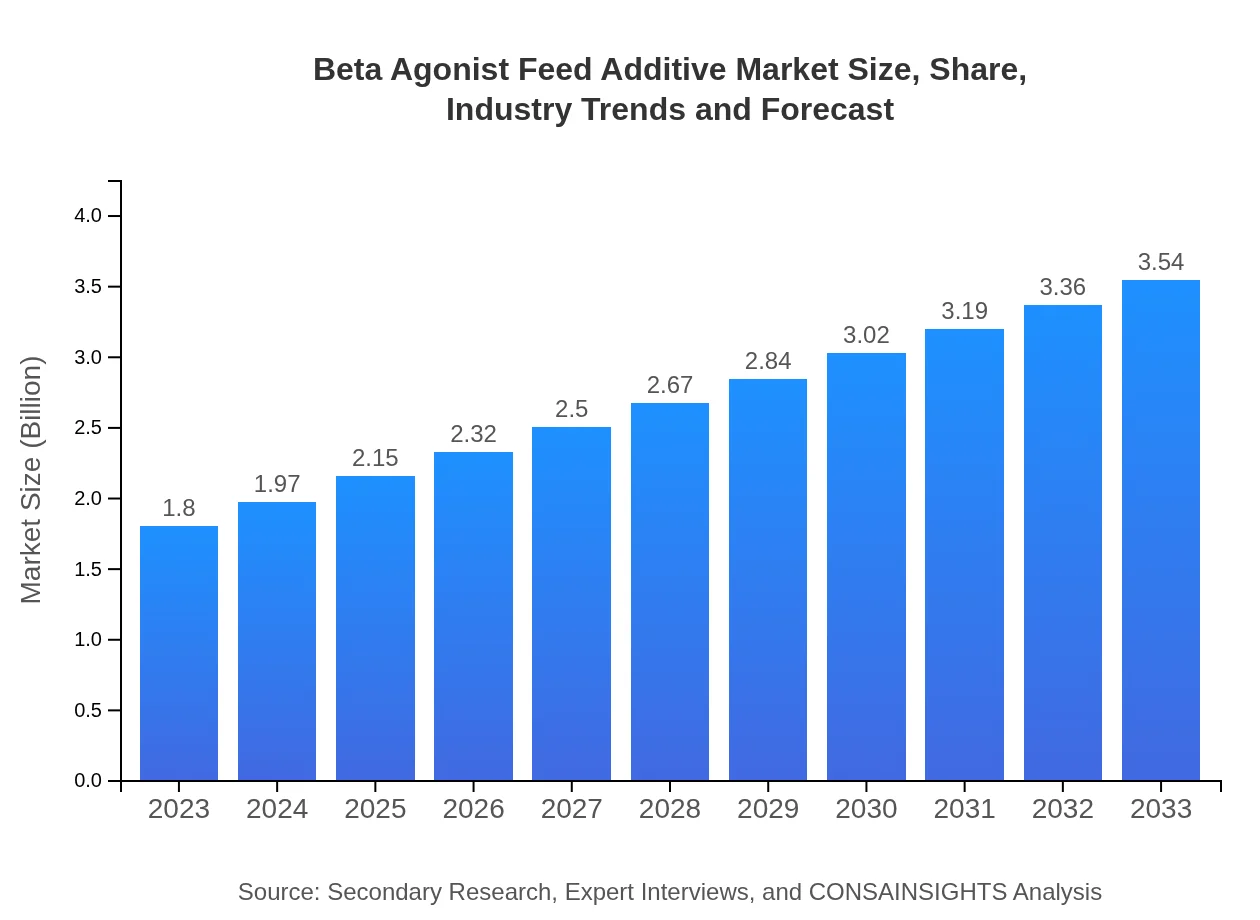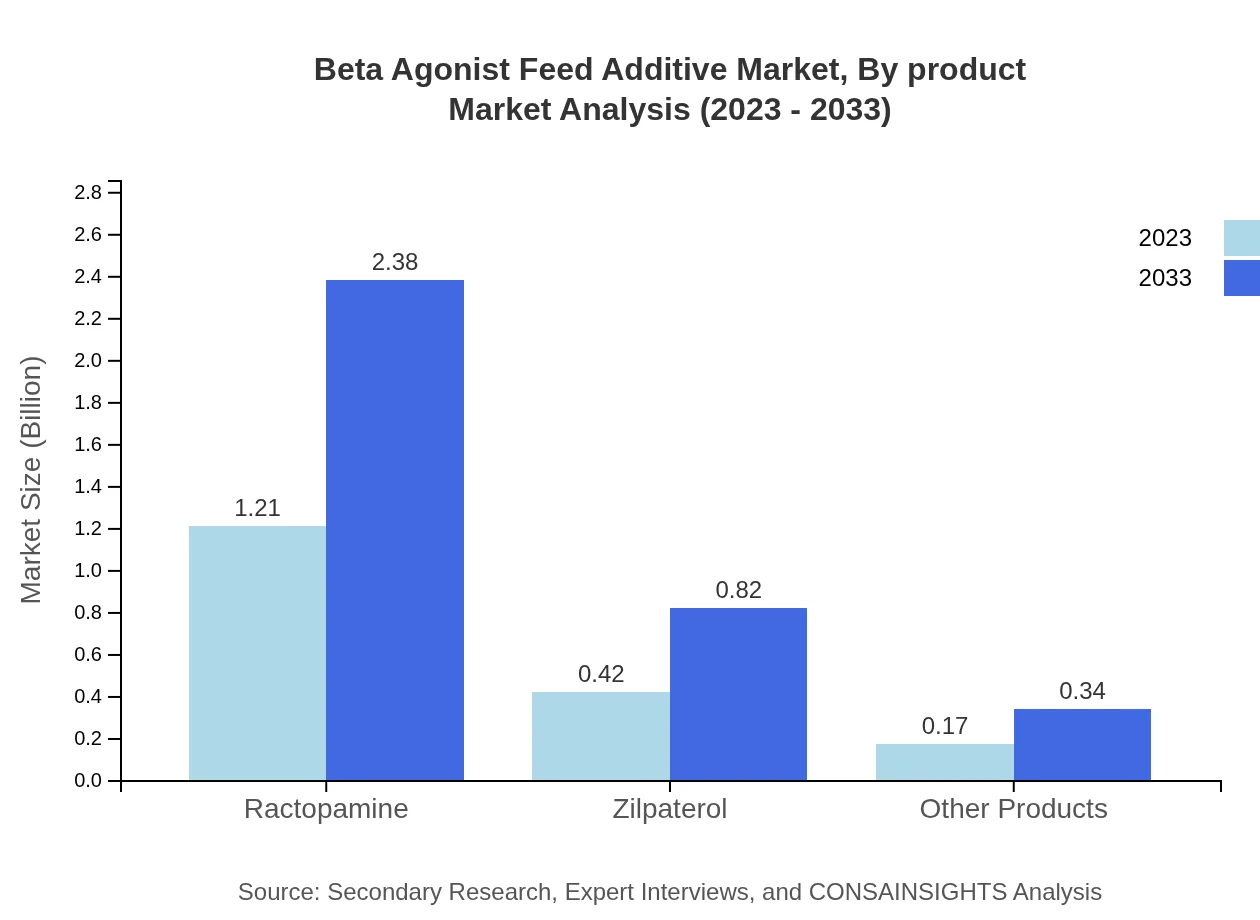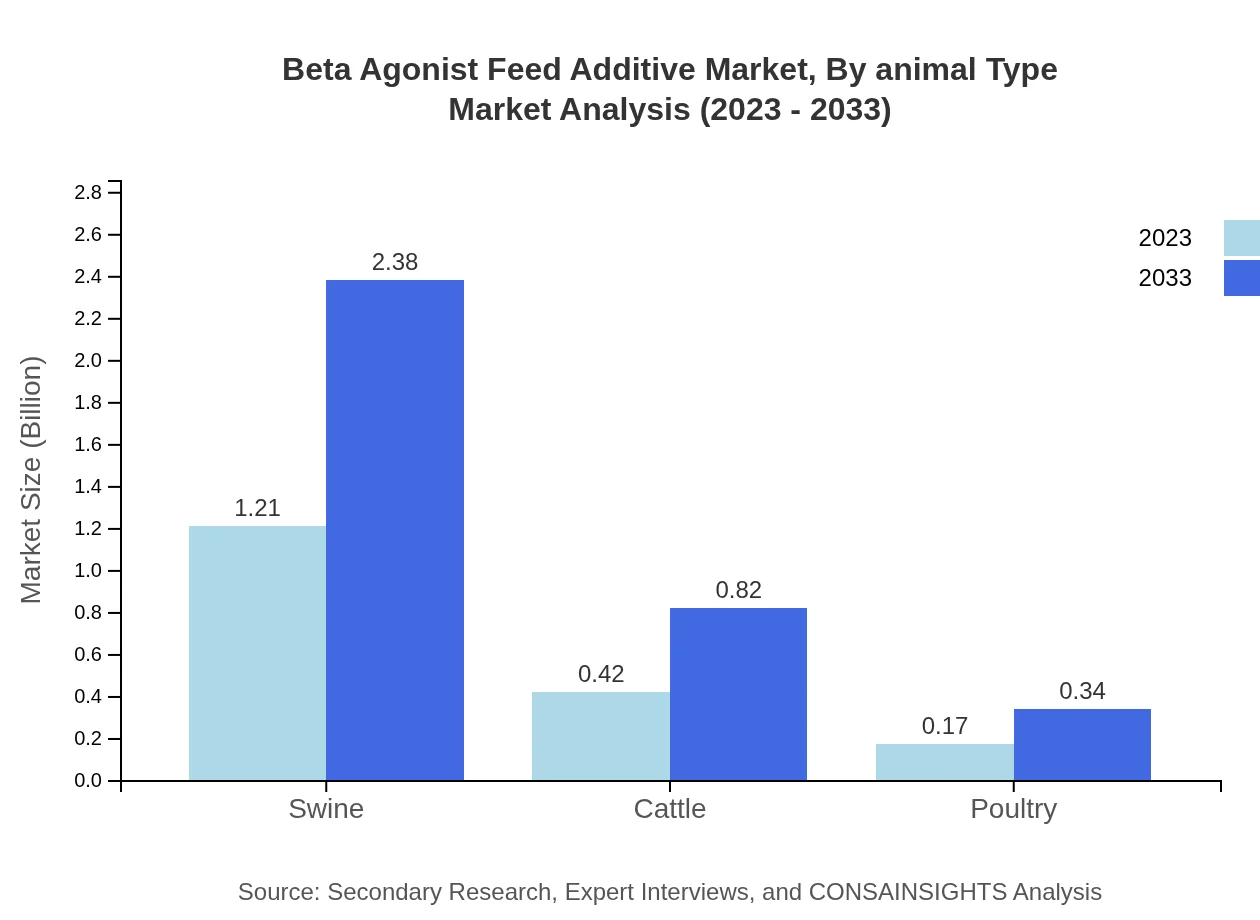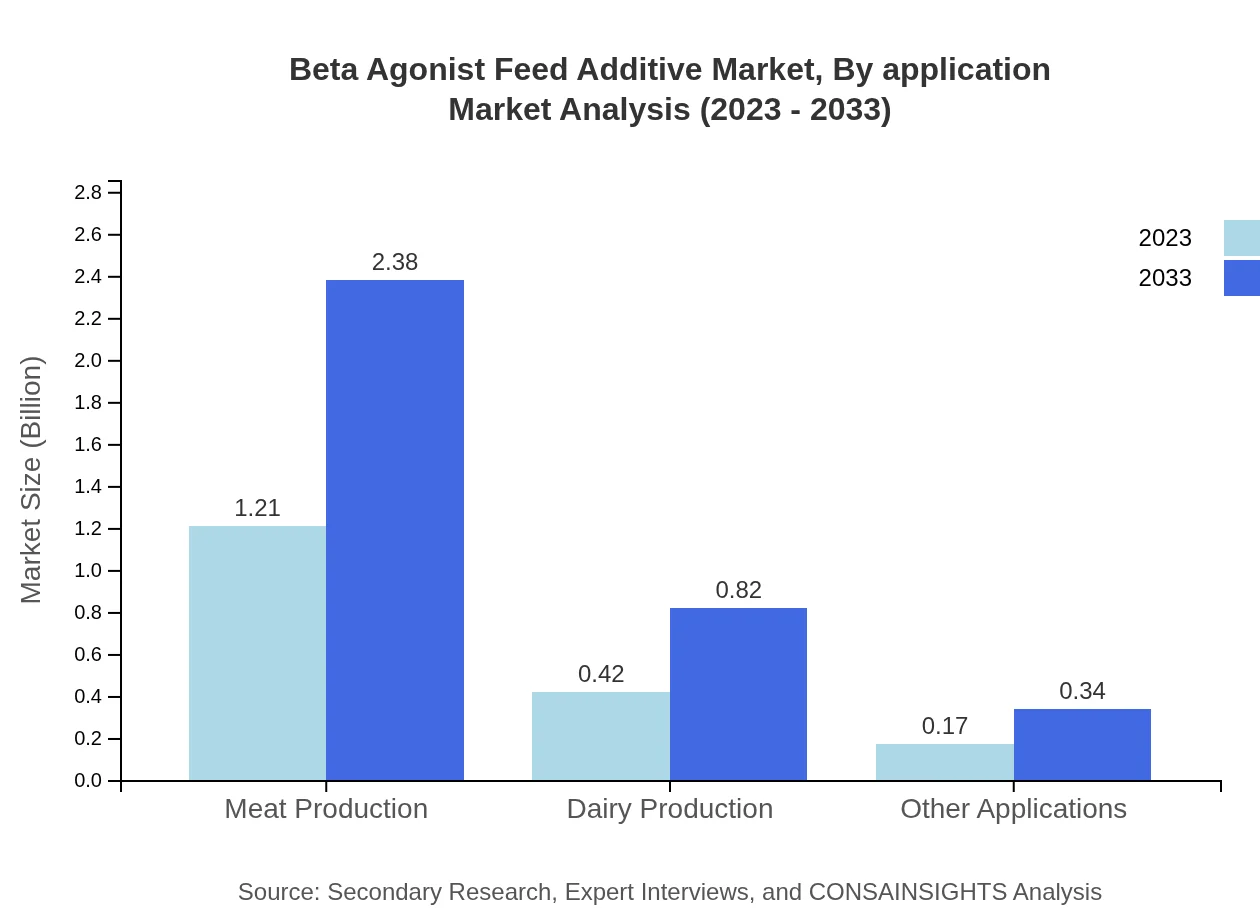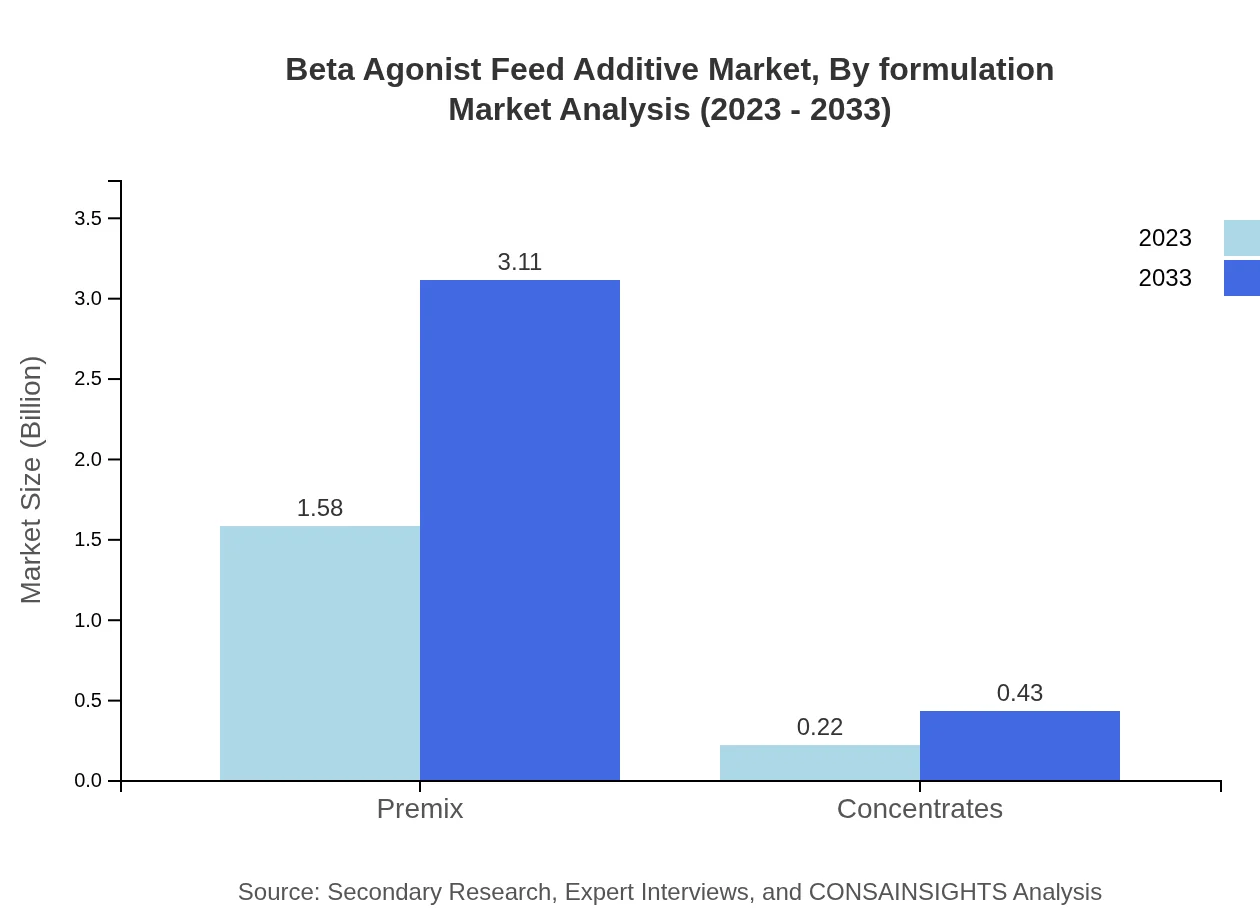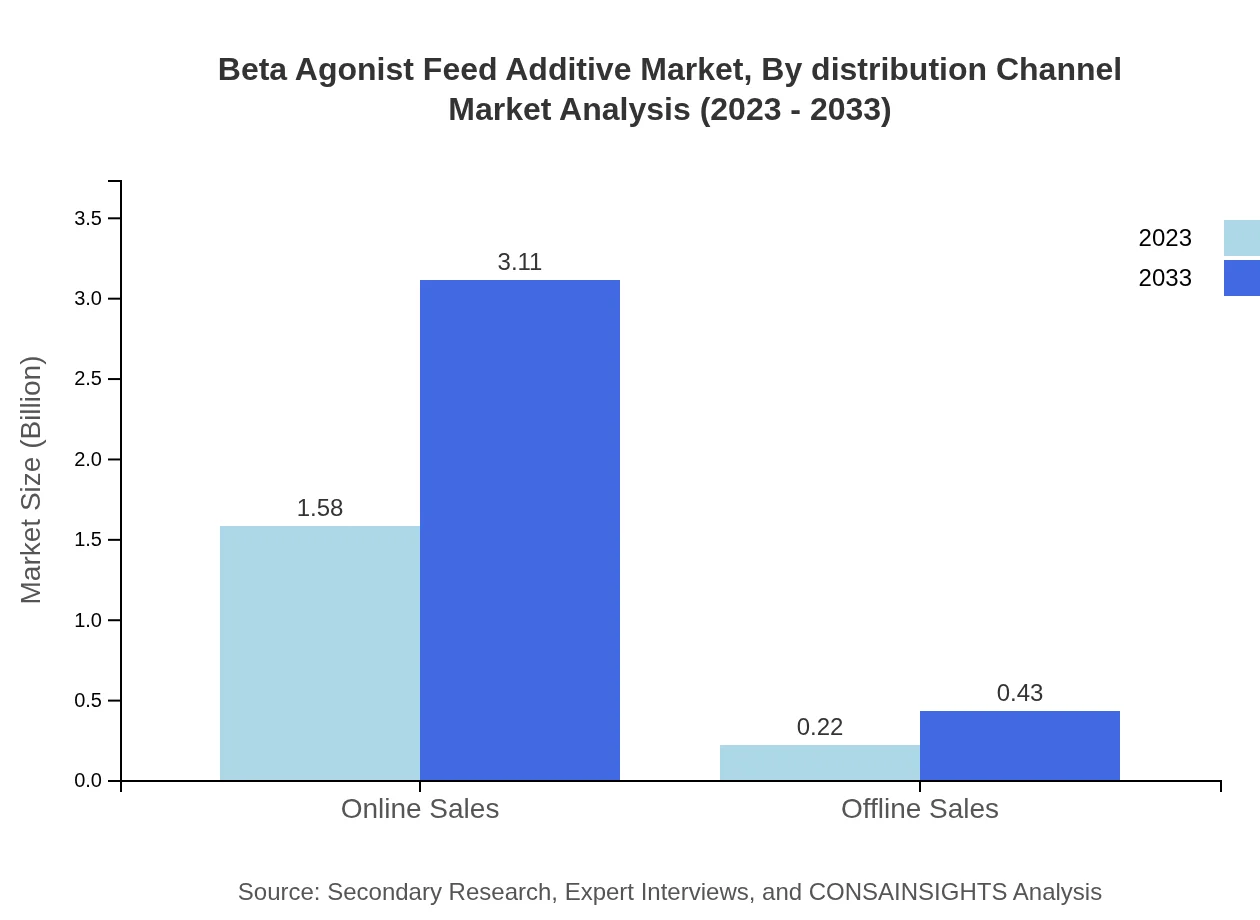Beta Agonist Feed Additive Market Report
Published Date: 31 January 2026 | Report Code: beta-agonist-feed-additive
Beta Agonist Feed Additive Market Size, Share, Industry Trends and Forecast to 2033
This report provides detailed insights into the Beta Agonist Feed Additive market from 2023 to 2033, including market size, growth forecasts, industry trends, and competitive landscape analysis.
| Metric | Value |
|---|---|
| Study Period | 2023 - 2033 |
| 2023 Market Size | $1.80 Billion |
| CAGR (2023-2033) | 6.8% |
| 2033 Market Size | $3.54 Billion |
| Top Companies | Elanco Animal Health, Zenoaq, Boehringer Ingelheim, Merck Animal Health |
| Last Modified Date | 31 January 2026 |
Beta Agonist Feed Additive Market Overview
Customize Beta Agonist Feed Additive Market Report market research report
- ✔ Get in-depth analysis of Beta Agonist Feed Additive market size, growth, and forecasts.
- ✔ Understand Beta Agonist Feed Additive's regional dynamics and industry-specific trends.
- ✔ Identify potential applications, end-user demand, and growth segments in Beta Agonist Feed Additive
What is the Market Size & CAGR of Beta Agonist Feed Additive market in 2023?
Beta Agonist Feed Additive Industry Analysis
Beta Agonist Feed Additive Market Segmentation and Scope
Tell us your focus area and get a customized research report.
Beta Agonist Feed Additive Market Analysis Report by Region
Europe Beta Agonist Feed Additive Market Report:
The European market was valued at $0.57 billion in 2023, expected to reach $1.12 billion by 2033. The region's focus on high-quality meat products and stricter regulations on animal health significantly shape market dynamics.Asia Pacific Beta Agonist Feed Additive Market Report:
The Asia Pacific region, valued at $0.33 billion in 2023, is projected to grow to $0.65 billion by 2033, driven by increasing livestock production and demand for meat. The rising adoption of modern feed management practices fosters this growth.North America Beta Agonist Feed Additive Market Report:
North America, particularly the U.S., is the largest market for Beta Agonist Feed Additives, projected to grow from $0.63 billion in 2023 to $1.24 billion by 2033, fueled by intensive livestock farming and technological advancements in animal nutrition.South America Beta Agonist Feed Additive Market Report:
In South America, the market is expected to rise from $0.16 billion in 2023 to $0.32 billion by 2033. The region benefits from its large agricultural sector, focusing on beef and poultry production, enhancing the demand for effective feed additives.Middle East & Africa Beta Agonist Feed Additive Market Report:
The Middle East and Africa show a modest increase from $0.10 billion in 2023 to $0.21 billion by 2033, driven by growing livestock industries and increasing awareness of feed efficiency.Tell us your focus area and get a customized research report.
Beta Agonist Feed Additive Market Analysis By Product
The primary products in the Beta Agonist Feed Additive market include Ractopamine and Zilpaterol. Ractopamine holds a substantial share, with market sizes projected to grow from $1.21 billion in 2023 to $2.38 billion in 2033, capturing 67.28% of the market. Zilpaterol, although smaller, is expected to increase from $0.42 billion to $0.82 billion, maintaining a 23.15% market share.
Beta Agonist Feed Additive Market Analysis By Animal Type
Ractopamine is predominantly used in swine, accounting for a market size of $1.21 billion in 2023, increasing to $2.38 billion by 2033. Cattle production utilizes Zilpaterol with anticipated growth from $0.42 billion to $0.82 billion by 2033, reflecting a persistent demand for protein-rich feed formulations.
Beta Agonist Feed Additive Market Analysis By Application
In terms of applications, meat and dairy production represent the largest segments. For meat production, the market is projected to grow from $1.21 billion in 2023 to $2.38 billion by 2033, while dairy applications are expected to grow from $0.42 billion to $0.82 billion over the same period.
Beta Agonist Feed Additive Market Analysis By Formulation
Premix formulations dominate the market, reaching $1.58 billion in 2023 with a forecast rise to $3.11 billion by 2033. Concentrates, while smaller, will also see growth from $0.22 billion to $0.43 billion. This indicates a substantial market preference for premixed feeds, facilitating ease of use for producers.
Beta Agonist Feed Additive Market Analysis By Distribution Channel
The distribution channels for Beta Agonist Feed Additives are predominantly online, projected to grow from $1.58 billion in 2023 to $3.11 billion by 2033. Offline sales account for a smaller market size but are also expected to increase from $0.22 billion to $0.43 billion, reflecting diverse purchasing preferences.
Beta Agonist Feed Additive Market Trends and Future Forecast
Tell us your focus area and get a customized research report.
Global Market Leaders and Top Companies in Beta Agonist Feed Additive Industry
Elanco Animal Health:
A leading company in animal health that focuses on innovative solutions, including beta agonist feed additives aimed at improving livestock growth and health.Zenoaq:
Specializes in veterinary pharmaceuticals and feed additives, contributing significantly to the global supply of beta agonists for animal feed.Boehringer Ingelheim:
Global pharmaceutical company with a strong focus on animal health products, including beta agonists that enhance the productivity of livestock.Merck Animal Health:
A major player in the animal health sector, providing various beta agonist feed additives along with a comprehensive range of veterinary services.We're grateful to work with incredible clients.









FAQs
What is the market size of beta Agonist Feed Additive?
The beta-agonist feed additive market is valued at $1.8 billion in 2023, with an expected growth rate (CAGR) of 6.8% projected through 2033.
What are the key market players or companies in this beta Agonist Feed Additive industry?
Key market players in the beta-agonist feed additive industry include major companies specializing in veterinary pharmaceuticals and animal nutrition, strengthening their market presence through innovative product development and strategic partnerships.
What are the primary factors driving the growth in the beta Agonist Feed Additive industry?
Growth factors for the beta-agonist feed additive industry include increasing demand for meat products, advancements in livestock nutrition, and the rising focus on efficiency in animal production to optimize feed conversion rates.
Which region is the fastest Growing in the beta Agonist Feed Additive?
The fastest-growing region in the beta-agonist feed additive market is Europe, with projected growth from $0.57 billion in 2023 to $1.12 billion by 2033, indicating robust demand for protein-rich feed.
Does ConsaInsights provide customized market report data for the beta Agonist Feed Additive industry?
Yes, ConsaInsights offers customized market report data for the beta-agonist feed additive industry, ensuring clients receive tailored insights and analysis specific to their business needs and strategic goals.
What deliverables can I expect from this beta Agonist Feed Additive market research project?
Deliverables from the beta-agonist feed additive market research project typically include comprehensive reports, data analysis, market forecasts, competitive landscape evaluations, and strategic recommendations based on findings.
What are the market trends of beta Agonist Feed Additive?
Market trends in the beta-agonist feed additive sector include a shift towards sustainable feed solutions, increased regulatory scrutiny, and the growing popularity of online sales channels to enhance product accessibility.

